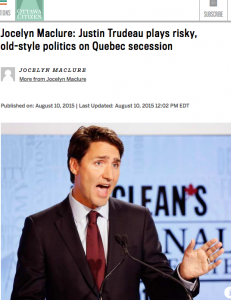It didn’t take long for the new Liberal government in Ottawa to start undoing the changes Stephen Harper made to the way the country is run over his nine years as prime minister. Many of these changes were in the tone and style of governance: Trudeau unmuzzled scientists, said nice things to public servants, promised more access and openness to journalists. From coast to coast to coast, bowling scores are up sharply, and mini-putt scores are way down.
Trudeau also took a few quick steps to reverse some of Harper’s key policies. Most notably, he immediately reinstated the mandatory long-form census, barely in time for the 2016 survey. Interestingly, the minister who oversaw the cancelling of the mandatory census, Tony Clement, could not bring himself to criticize Trudeau’s move last week, saying that in retrospect “I think I would have done it differently.” (On a related note: Conservative interim leader Rona Ambrose has come out in favour of an inquiry into missing and murdered aboriginal women.… Continue reading

